Critical Social Work: A Deep Dive into Gender and Disability Issues
VerifiedAdded on 2023/05/30
|9
|2578
|331
Essay
AI Summary
This essay provides a comprehensive analysis of gender and disability discrimination within the field of social work. It begins by outlining the ethical obligations of social workers to combat discrimination, as highlighted in the social work code of ethics. The essay then delves into the specifics of gender discrimination, particularly against women, discussing factors such as illiteracy and the resulting limitations on employment opportunities. It also examines international and governmental efforts to promote gender equality, including community interventions, financial schemes, and legislative measures. The adverse effects of gender discrimination, such as increased poverty, higher mortality rates, and poor governance, are also explored. Furthermore, the essay addresses disability discrimination in the workplace and healthcare settings, highlighting the disparities in employment opportunities and salaries. It discusses international initiatives like UNCRPD and governmental programs aimed at educating and supporting individuals with disabilities. The essay concludes by recommending strategies to combat discrimination, including embracing feminism empowerment theory, developing anti-oppressive laws, promoting knowledge of rights, and investing in technological advancements to improve the lives of people with disabilities. The ultimate goal is to foster a more inclusive and equitable society where all individuals, regardless of gender or disability, can contribute to community growth and development.
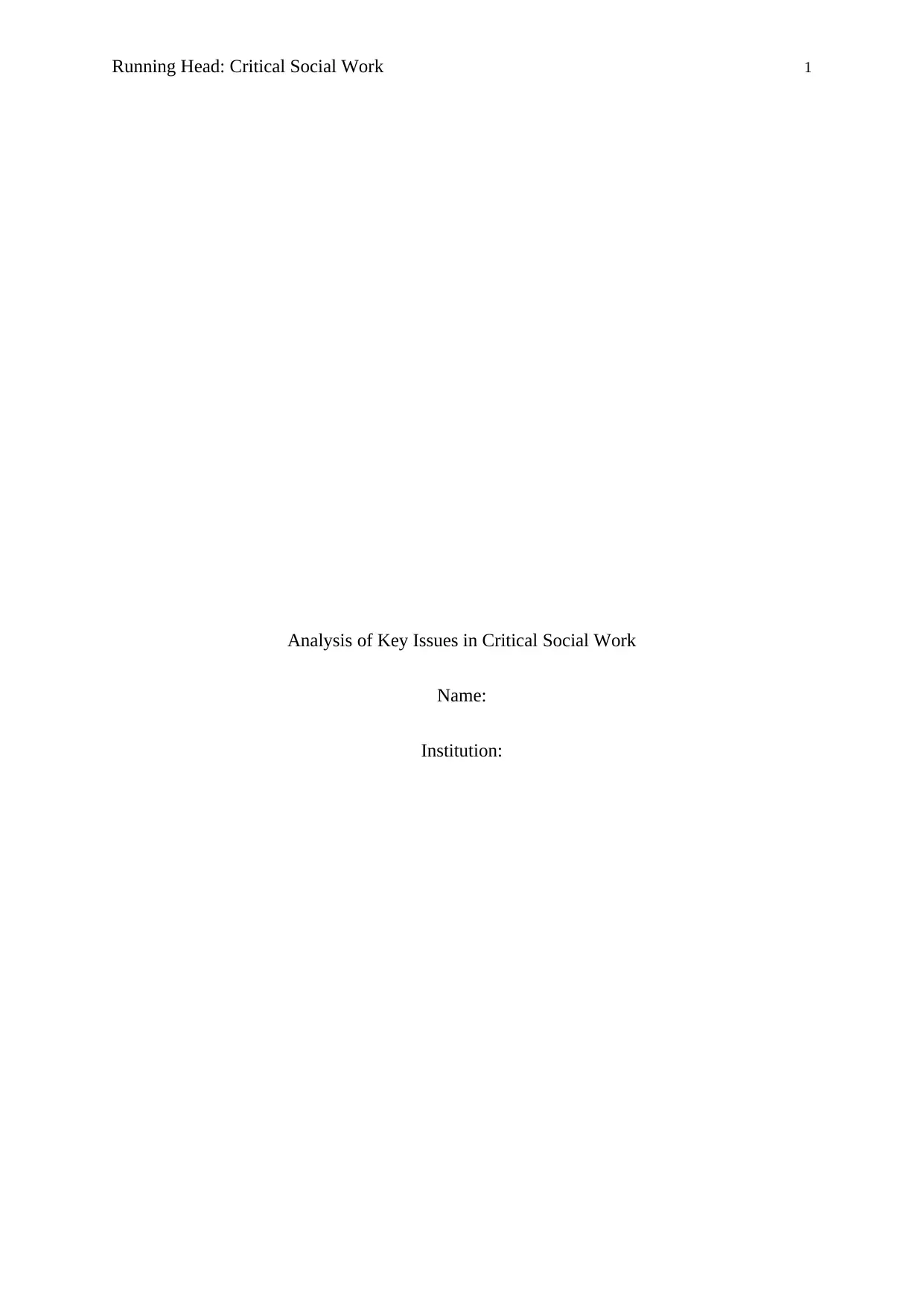
Running Head: Critical Social Work 1
Analysis of Key Issues in Critical Social Work
Name:
Institution:
Analysis of Key Issues in Critical Social Work
Name:
Institution:
Paraphrase This Document
Need a fresh take? Get an instant paraphrase of this document with our AI Paraphraser
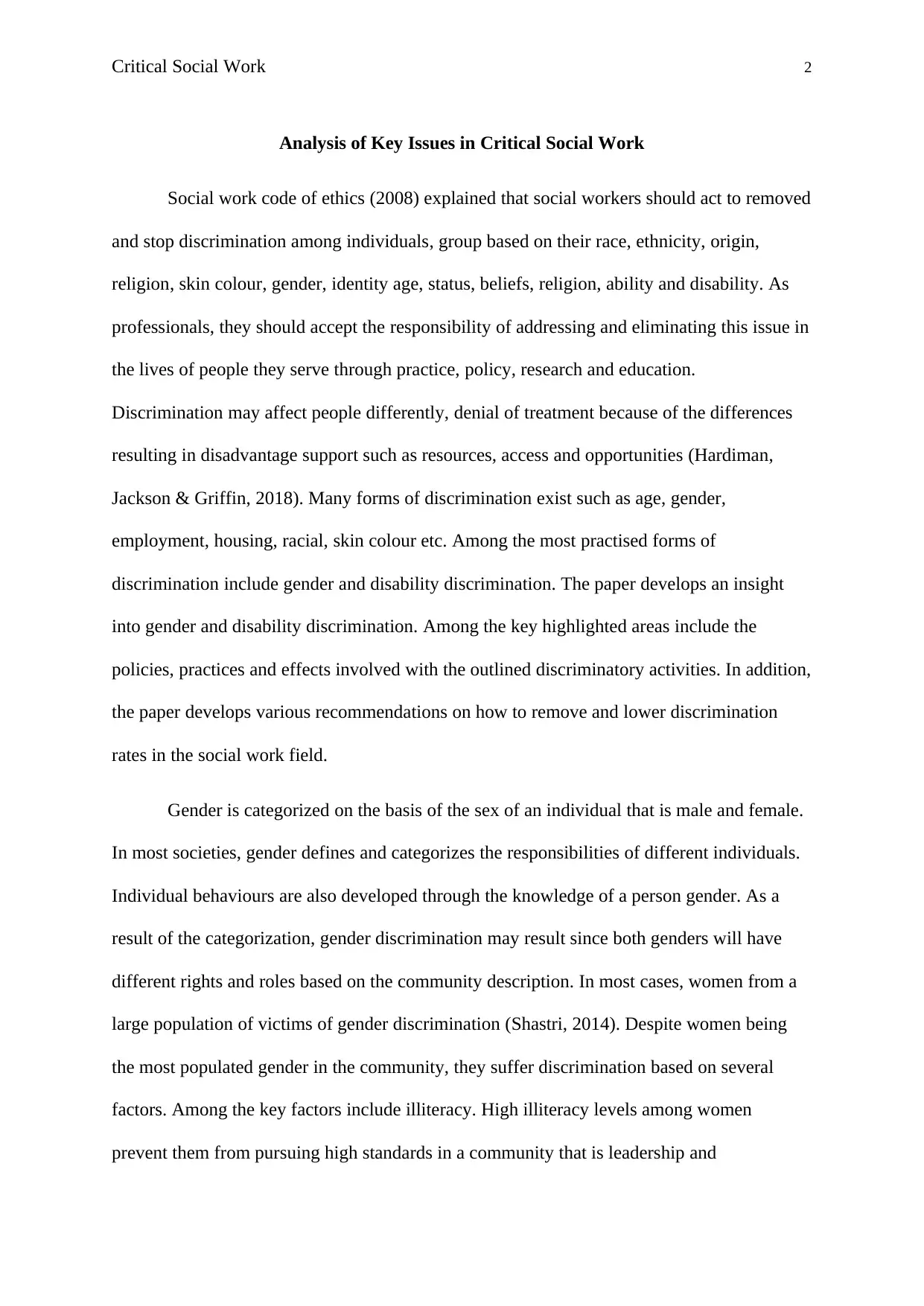
Critical Social Work 2
Analysis of Key Issues in Critical Social Work
Social work code of ethics (2008) explained that social workers should act to removed
and stop discrimination among individuals, group based on their race, ethnicity, origin,
religion, skin colour, gender, identity age, status, beliefs, religion, ability and disability. As
professionals, they should accept the responsibility of addressing and eliminating this issue in
the lives of people they serve through practice, policy, research and education.
Discrimination may affect people differently, denial of treatment because of the differences
resulting in disadvantage support such as resources, access and opportunities (Hardiman,
Jackson & Griffin, 2018). Many forms of discrimination exist such as age, gender,
employment, housing, racial, skin colour etc. Among the most practised forms of
discrimination include gender and disability discrimination. The paper develops an insight
into gender and disability discrimination. Among the key highlighted areas include the
policies, practices and effects involved with the outlined discriminatory activities. In addition,
the paper develops various recommendations on how to remove and lower discrimination
rates in the social work field.
Gender is categorized on the basis of the sex of an individual that is male and female.
In most societies, gender defines and categorizes the responsibilities of different individuals.
Individual behaviours are also developed through the knowledge of a person gender. As a
result of the categorization, gender discrimination may result since both genders will have
different rights and roles based on the community description. In most cases, women from a
large population of victims of gender discrimination (Shastri, 2014). Despite women being
the most populated gender in the community, they suffer discrimination based on several
factors. Among the key factors include illiteracy. High illiteracy levels among women
prevent them from pursuing high standards in a community that is leadership and
Analysis of Key Issues in Critical Social Work
Social work code of ethics (2008) explained that social workers should act to removed
and stop discrimination among individuals, group based on their race, ethnicity, origin,
religion, skin colour, gender, identity age, status, beliefs, religion, ability and disability. As
professionals, they should accept the responsibility of addressing and eliminating this issue in
the lives of people they serve through practice, policy, research and education.
Discrimination may affect people differently, denial of treatment because of the differences
resulting in disadvantage support such as resources, access and opportunities (Hardiman,
Jackson & Griffin, 2018). Many forms of discrimination exist such as age, gender,
employment, housing, racial, skin colour etc. Among the most practised forms of
discrimination include gender and disability discrimination. The paper develops an insight
into gender and disability discrimination. Among the key highlighted areas include the
policies, practices and effects involved with the outlined discriminatory activities. In addition,
the paper develops various recommendations on how to remove and lower discrimination
rates in the social work field.
Gender is categorized on the basis of the sex of an individual that is male and female.
In most societies, gender defines and categorizes the responsibilities of different individuals.
Individual behaviours are also developed through the knowledge of a person gender. As a
result of the categorization, gender discrimination may result since both genders will have
different rights and roles based on the community description. In most cases, women from a
large population of victims of gender discrimination (Shastri, 2014). Despite women being
the most populated gender in the community, they suffer discrimination based on several
factors. Among the key factors include illiteracy. High illiteracy levels among women
prevent them from pursuing high standards in a community that is leadership and
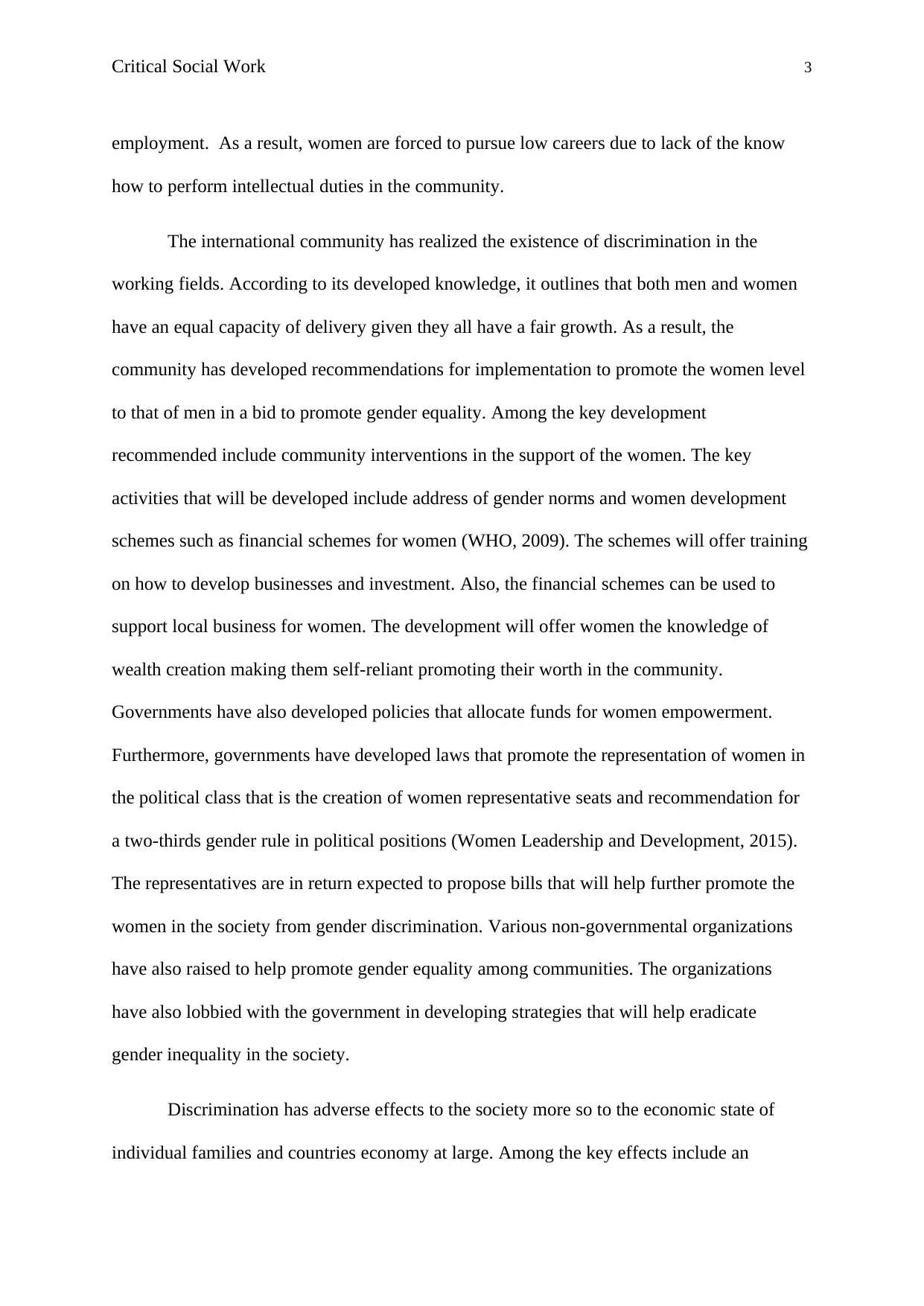
Critical Social Work 3
employment. As a result, women are forced to pursue low careers due to lack of the know
how to perform intellectual duties in the community.
The international community has realized the existence of discrimination in the
working fields. According to its developed knowledge, it outlines that both men and women
have an equal capacity of delivery given they all have a fair growth. As a result, the
community has developed recommendations for implementation to promote the women level
to that of men in a bid to promote gender equality. Among the key development
recommended include community interventions in the support of the women. The key
activities that will be developed include address of gender norms and women development
schemes such as financial schemes for women (WHO, 2009). The schemes will offer training
on how to develop businesses and investment. Also, the financial schemes can be used to
support local business for women. The development will offer women the knowledge of
wealth creation making them self-reliant promoting their worth in the community.
Governments have also developed policies that allocate funds for women empowerment.
Furthermore, governments have developed laws that promote the representation of women in
the political class that is the creation of women representative seats and recommendation for
a two-thirds gender rule in political positions (Women Leadership and Development, 2015).
The representatives are in return expected to propose bills that will help further promote the
women in the society from gender discrimination. Various non-governmental organizations
have also raised to help promote gender equality among communities. The organizations
have also lobbied with the government in developing strategies that will help eradicate
gender inequality in the society.
Discrimination has adverse effects to the society more so to the economic state of
individual families and countries economy at large. Among the key effects include an
employment. As a result, women are forced to pursue low careers due to lack of the know
how to perform intellectual duties in the community.
The international community has realized the existence of discrimination in the
working fields. According to its developed knowledge, it outlines that both men and women
have an equal capacity of delivery given they all have a fair growth. As a result, the
community has developed recommendations for implementation to promote the women level
to that of men in a bid to promote gender equality. Among the key development
recommended include community interventions in the support of the women. The key
activities that will be developed include address of gender norms and women development
schemes such as financial schemes for women (WHO, 2009). The schemes will offer training
on how to develop businesses and investment. Also, the financial schemes can be used to
support local business for women. The development will offer women the knowledge of
wealth creation making them self-reliant promoting their worth in the community.
Governments have also developed policies that allocate funds for women empowerment.
Furthermore, governments have developed laws that promote the representation of women in
the political class that is the creation of women representative seats and recommendation for
a two-thirds gender rule in political positions (Women Leadership and Development, 2015).
The representatives are in return expected to propose bills that will help further promote the
women in the society from gender discrimination. Various non-governmental organizations
have also raised to help promote gender equality among communities. The organizations
have also lobbied with the government in developing strategies that will help eradicate
gender inequality in the society.
Discrimination has adverse effects to the society more so to the economic state of
individual families and countries economy at large. Among the key effects include an
⊘ This is a preview!⊘
Do you want full access?
Subscribe today to unlock all pages.

Trusted by 1+ million students worldwide
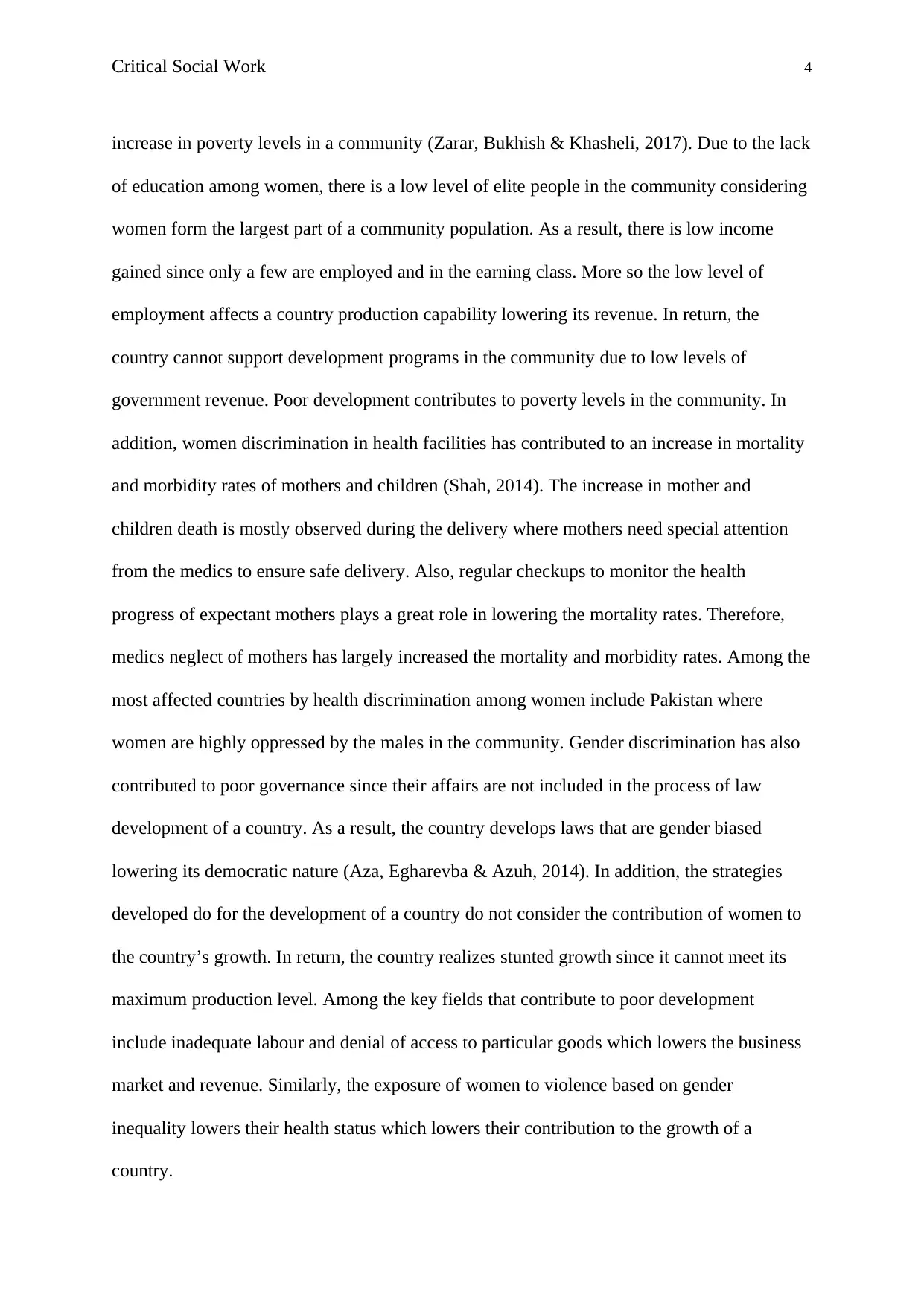
Critical Social Work 4
increase in poverty levels in a community (Zarar, Bukhish & Khasheli, 2017). Due to the lack
of education among women, there is a low level of elite people in the community considering
women form the largest part of a community population. As a result, there is low income
gained since only a few are employed and in the earning class. More so the low level of
employment affects a country production capability lowering its revenue. In return, the
country cannot support development programs in the community due to low levels of
government revenue. Poor development contributes to poverty levels in the community. In
addition, women discrimination in health facilities has contributed to an increase in mortality
and morbidity rates of mothers and children (Shah, 2014). The increase in mother and
children death is mostly observed during the delivery where mothers need special attention
from the medics to ensure safe delivery. Also, regular checkups to monitor the health
progress of expectant mothers plays a great role in lowering the mortality rates. Therefore,
medics neglect of mothers has largely increased the mortality and morbidity rates. Among the
most affected countries by health discrimination among women include Pakistan where
women are highly oppressed by the males in the community. Gender discrimination has also
contributed to poor governance since their affairs are not included in the process of law
development of a country. As a result, the country develops laws that are gender biased
lowering its democratic nature (Aza, Egharevba & Azuh, 2014). In addition, the strategies
developed do for the development of a country do not consider the contribution of women to
the country’s growth. In return, the country realizes stunted growth since it cannot meet its
maximum production level. Among the key fields that contribute to poor development
include inadequate labour and denial of access to particular goods which lowers the business
market and revenue. Similarly, the exposure of women to violence based on gender
inequality lowers their health status which lowers their contribution to the growth of a
country.
increase in poverty levels in a community (Zarar, Bukhish & Khasheli, 2017). Due to the lack
of education among women, there is a low level of elite people in the community considering
women form the largest part of a community population. As a result, there is low income
gained since only a few are employed and in the earning class. More so the low level of
employment affects a country production capability lowering its revenue. In return, the
country cannot support development programs in the community due to low levels of
government revenue. Poor development contributes to poverty levels in the community. In
addition, women discrimination in health facilities has contributed to an increase in mortality
and morbidity rates of mothers and children (Shah, 2014). The increase in mother and
children death is mostly observed during the delivery where mothers need special attention
from the medics to ensure safe delivery. Also, regular checkups to monitor the health
progress of expectant mothers plays a great role in lowering the mortality rates. Therefore,
medics neglect of mothers has largely increased the mortality and morbidity rates. Among the
most affected countries by health discrimination among women include Pakistan where
women are highly oppressed by the males in the community. Gender discrimination has also
contributed to poor governance since their affairs are not included in the process of law
development of a country. As a result, the country develops laws that are gender biased
lowering its democratic nature (Aza, Egharevba & Azuh, 2014). In addition, the strategies
developed do for the development of a country do not consider the contribution of women to
the country’s growth. In return, the country realizes stunted growth since it cannot meet its
maximum production level. Among the key fields that contribute to poor development
include inadequate labour and denial of access to particular goods which lowers the business
market and revenue. Similarly, the exposure of women to violence based on gender
inequality lowers their health status which lowers their contribution to the growth of a
country.
Paraphrase This Document
Need a fresh take? Get an instant paraphrase of this document with our AI Paraphraser

Critical Social Work 5
Disability is a major base of discrimination in work environments more so in the
employment sector where business look down upon the disabled. According to research
conducted by research and economic administration, it was found out that the employment
opportunities for people with disabilities were 2.6% lower in comparison to the healthy
(Alfasi, 2008). Furthermore, the disabled are offered low salaries in the industries compared
to healthy employees. The deduction is justified on the basis of absence following frequent
medical check-ups to ensure they are healthy. More so companies do consider the high cost
of training of the disabled in order to help them adapt to the working environment. Israel acts
as a good example where disability discrimination takes place. According to the research, it
was found that the salaries paid to the disabled between the year 2002 and 2006 were 2000
NIS less in comparison to those paid to the health workers. The disabled are also
discriminated in health centres despite their high need for frequent health checkups. Nurses
and medics do often neglect them due to the much time consumed attending to them.
Following the oppression developed by the discrimination of the disabled,
international community and local governments have developed strategies to help curb the
vice. Among the key developments made include the development of UNCRPD by the
international community through the United Nations. UNCRPD was a treaty signed by the
United Nations that entail the and describe rights of the disabled (Njelesani, Siegei & Ullrich,
2018). The document also outlines the role of local governments in promoting the status of
people living with disabilities in the community more so in the business field that is
employment and salary development. Governments have also developed a program for
educating the disabled in order to offer them with the knowledge required in the business
platforms (Thompson, 2017). The acquisition of business knowledge will help them in
adjusting to the business field with much ease. In addition, governments have ensured that the
disabled are represented in the leadership structure where their representative develop
Disability is a major base of discrimination in work environments more so in the
employment sector where business look down upon the disabled. According to research
conducted by research and economic administration, it was found out that the employment
opportunities for people with disabilities were 2.6% lower in comparison to the healthy
(Alfasi, 2008). Furthermore, the disabled are offered low salaries in the industries compared
to healthy employees. The deduction is justified on the basis of absence following frequent
medical check-ups to ensure they are healthy. More so companies do consider the high cost
of training of the disabled in order to help them adapt to the working environment. Israel acts
as a good example where disability discrimination takes place. According to the research, it
was found that the salaries paid to the disabled between the year 2002 and 2006 were 2000
NIS less in comparison to those paid to the health workers. The disabled are also
discriminated in health centres despite their high need for frequent health checkups. Nurses
and medics do often neglect them due to the much time consumed attending to them.
Following the oppression developed by the discrimination of the disabled,
international community and local governments have developed strategies to help curb the
vice. Among the key developments made include the development of UNCRPD by the
international community through the United Nations. UNCRPD was a treaty signed by the
United Nations that entail the and describe rights of the disabled (Njelesani, Siegei & Ullrich,
2018). The document also outlines the role of local governments in promoting the status of
people living with disabilities in the community more so in the business field that is
employment and salary development. Governments have also developed a program for
educating the disabled in order to offer them with the knowledge required in the business
platforms (Thompson, 2017). The acquisition of business knowledge will help them in
adjusting to the business field with much ease. In addition, governments have ensured that the
disabled are represented in the leadership structure where their representative develop
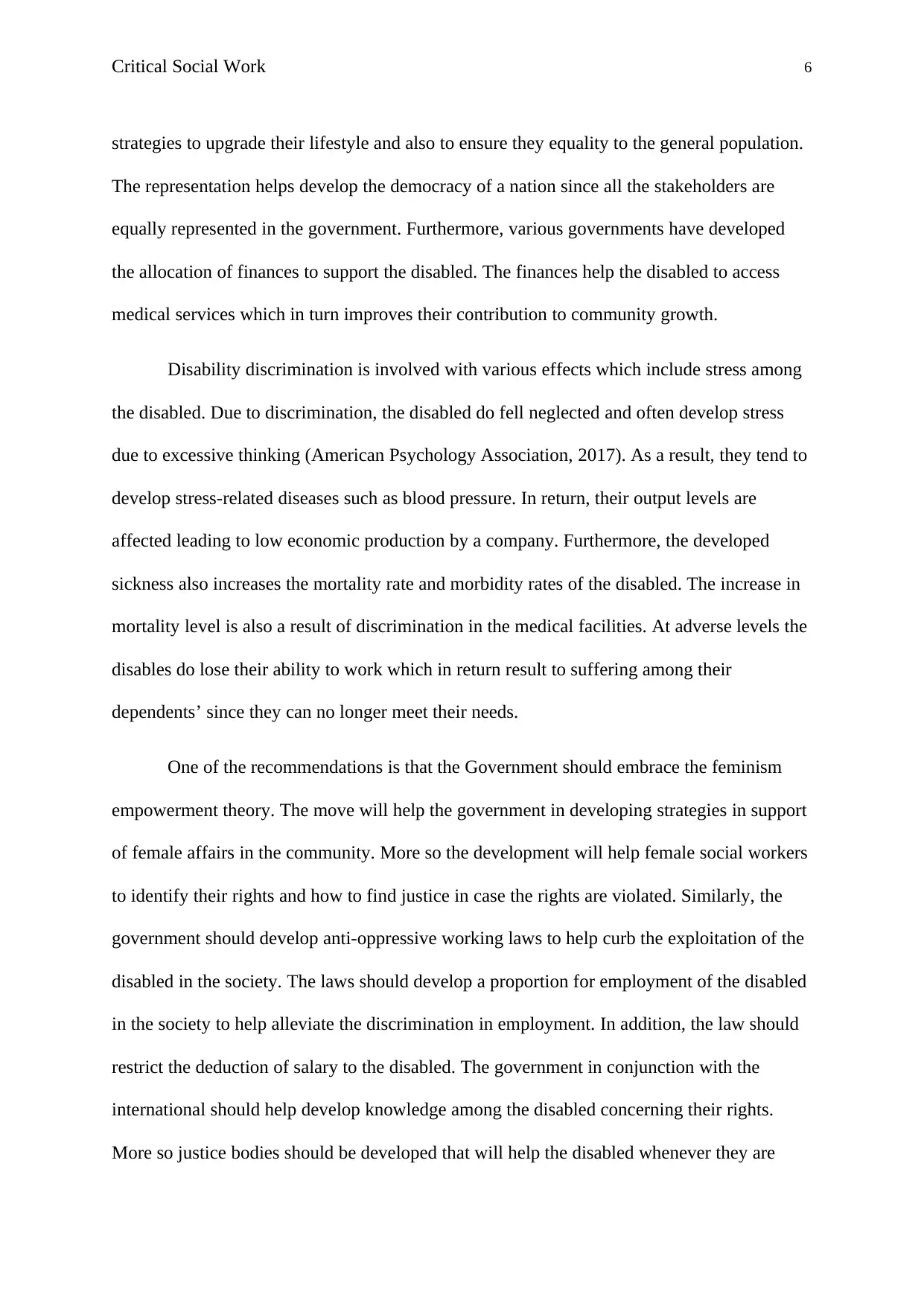
Critical Social Work 6
strategies to upgrade their lifestyle and also to ensure they equality to the general population.
The representation helps develop the democracy of a nation since all the stakeholders are
equally represented in the government. Furthermore, various governments have developed
the allocation of finances to support the disabled. The finances help the disabled to access
medical services which in turn improves their contribution to community growth.
Disability discrimination is involved with various effects which include stress among
the disabled. Due to discrimination, the disabled do fell neglected and often develop stress
due to excessive thinking (American Psychology Association, 2017). As a result, they tend to
develop stress-related diseases such as blood pressure. In return, their output levels are
affected leading to low economic production by a company. Furthermore, the developed
sickness also increases the mortality rate and morbidity rates of the disabled. The increase in
mortality level is also a result of discrimination in the medical facilities. At adverse levels the
disables do lose their ability to work which in return result to suffering among their
dependents’ since they can no longer meet their needs.
One of the recommendations is that the Government should embrace the feminism
empowerment theory. The move will help the government in developing strategies in support
of female affairs in the community. More so the development will help female social workers
to identify their rights and how to find justice in case the rights are violated. Similarly, the
government should develop anti-oppressive working laws to help curb the exploitation of the
disabled in the society. The laws should develop a proportion for employment of the disabled
in the society to help alleviate the discrimination in employment. In addition, the law should
restrict the deduction of salary to the disabled. The government in conjunction with the
international should help develop knowledge among the disabled concerning their rights.
More so justice bodies should be developed that will help the disabled whenever they are
strategies to upgrade their lifestyle and also to ensure they equality to the general population.
The representation helps develop the democracy of a nation since all the stakeholders are
equally represented in the government. Furthermore, various governments have developed
the allocation of finances to support the disabled. The finances help the disabled to access
medical services which in turn improves their contribution to community growth.
Disability discrimination is involved with various effects which include stress among
the disabled. Due to discrimination, the disabled do fell neglected and often develop stress
due to excessive thinking (American Psychology Association, 2017). As a result, they tend to
develop stress-related diseases such as blood pressure. In return, their output levels are
affected leading to low economic production by a company. Furthermore, the developed
sickness also increases the mortality rate and morbidity rates of the disabled. The increase in
mortality level is also a result of discrimination in the medical facilities. At adverse levels the
disables do lose their ability to work which in return result to suffering among their
dependents’ since they can no longer meet their needs.
One of the recommendations is that the Government should embrace the feminism
empowerment theory. The move will help the government in developing strategies in support
of female affairs in the community. More so the development will help female social workers
to identify their rights and how to find justice in case the rights are violated. Similarly, the
government should develop anti-oppressive working laws to help curb the exploitation of the
disabled in the society. The laws should develop a proportion for employment of the disabled
in the society to help alleviate the discrimination in employment. In addition, the law should
restrict the deduction of salary to the disabled. The government in conjunction with the
international should help develop knowledge among the disabled concerning their rights.
More so justice bodies should be developed that will help the disabled whenever they are
⊘ This is a preview!⊘
Do you want full access?
Subscribe today to unlock all pages.

Trusted by 1+ million students worldwide
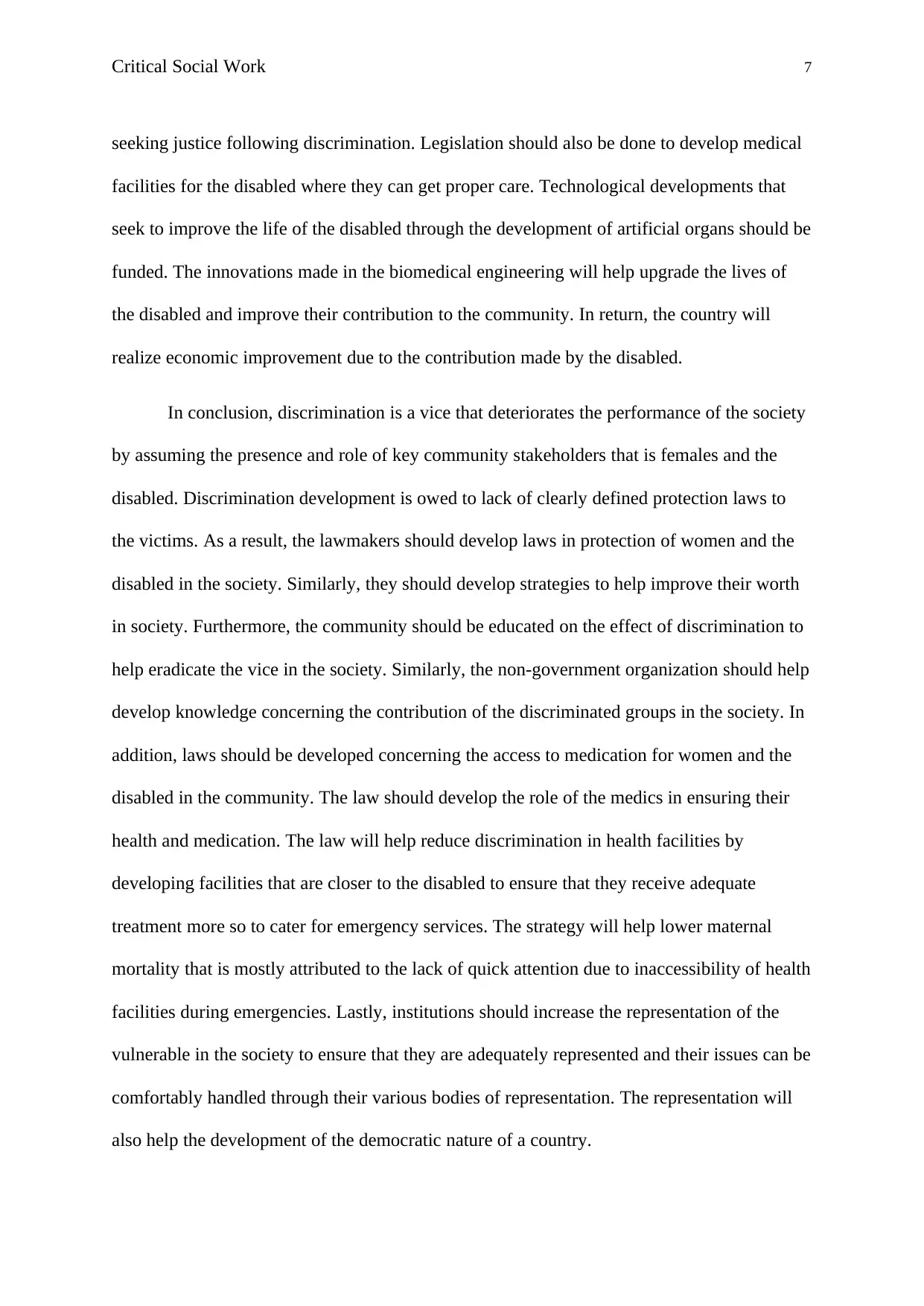
Critical Social Work 7
seeking justice following discrimination. Legislation should also be done to develop medical
facilities for the disabled where they can get proper care. Technological developments that
seek to improve the life of the disabled through the development of artificial organs should be
funded. The innovations made in the biomedical engineering will help upgrade the lives of
the disabled and improve their contribution to the community. In return, the country will
realize economic improvement due to the contribution made by the disabled.
In conclusion, discrimination is a vice that deteriorates the performance of the society
by assuming the presence and role of key community stakeholders that is females and the
disabled. Discrimination development is owed to lack of clearly defined protection laws to
the victims. As a result, the lawmakers should develop laws in protection of women and the
disabled in the society. Similarly, they should develop strategies to help improve their worth
in society. Furthermore, the community should be educated on the effect of discrimination to
help eradicate the vice in the society. Similarly, the non-government organization should help
develop knowledge concerning the contribution of the discriminated groups in the society. In
addition, laws should be developed concerning the access to medication for women and the
disabled in the community. The law should develop the role of the medics in ensuring their
health and medication. The law will help reduce discrimination in health facilities by
developing facilities that are closer to the disabled to ensure that they receive adequate
treatment more so to cater for emergency services. The strategy will help lower maternal
mortality that is mostly attributed to the lack of quick attention due to inaccessibility of health
facilities during emergencies. Lastly, institutions should increase the representation of the
vulnerable in the society to ensure that they are adequately represented and their issues can be
comfortably handled through their various bodies of representation. The representation will
also help the development of the democratic nature of a country.
seeking justice following discrimination. Legislation should also be done to develop medical
facilities for the disabled where they can get proper care. Technological developments that
seek to improve the life of the disabled through the development of artificial organs should be
funded. The innovations made in the biomedical engineering will help upgrade the lives of
the disabled and improve their contribution to the community. In return, the country will
realize economic improvement due to the contribution made by the disabled.
In conclusion, discrimination is a vice that deteriorates the performance of the society
by assuming the presence and role of key community stakeholders that is females and the
disabled. Discrimination development is owed to lack of clearly defined protection laws to
the victims. As a result, the lawmakers should develop laws in protection of women and the
disabled in the society. Similarly, they should develop strategies to help improve their worth
in society. Furthermore, the community should be educated on the effect of discrimination to
help eradicate the vice in the society. Similarly, the non-government organization should help
develop knowledge concerning the contribution of the discriminated groups in the society. In
addition, laws should be developed concerning the access to medication for women and the
disabled in the community. The law should develop the role of the medics in ensuring their
health and medication. The law will help reduce discrimination in health facilities by
developing facilities that are closer to the disabled to ensure that they receive adequate
treatment more so to cater for emergency services. The strategy will help lower maternal
mortality that is mostly attributed to the lack of quick attention due to inaccessibility of health
facilities during emergencies. Lastly, institutions should increase the representation of the
vulnerable in the society to ensure that they are adequately represented and their issues can be
comfortably handled through their various bodies of representation. The representation will
also help the development of the democratic nature of a country.
Paraphrase This Document
Need a fresh take? Get an instant paraphrase of this document with our AI Paraphraser
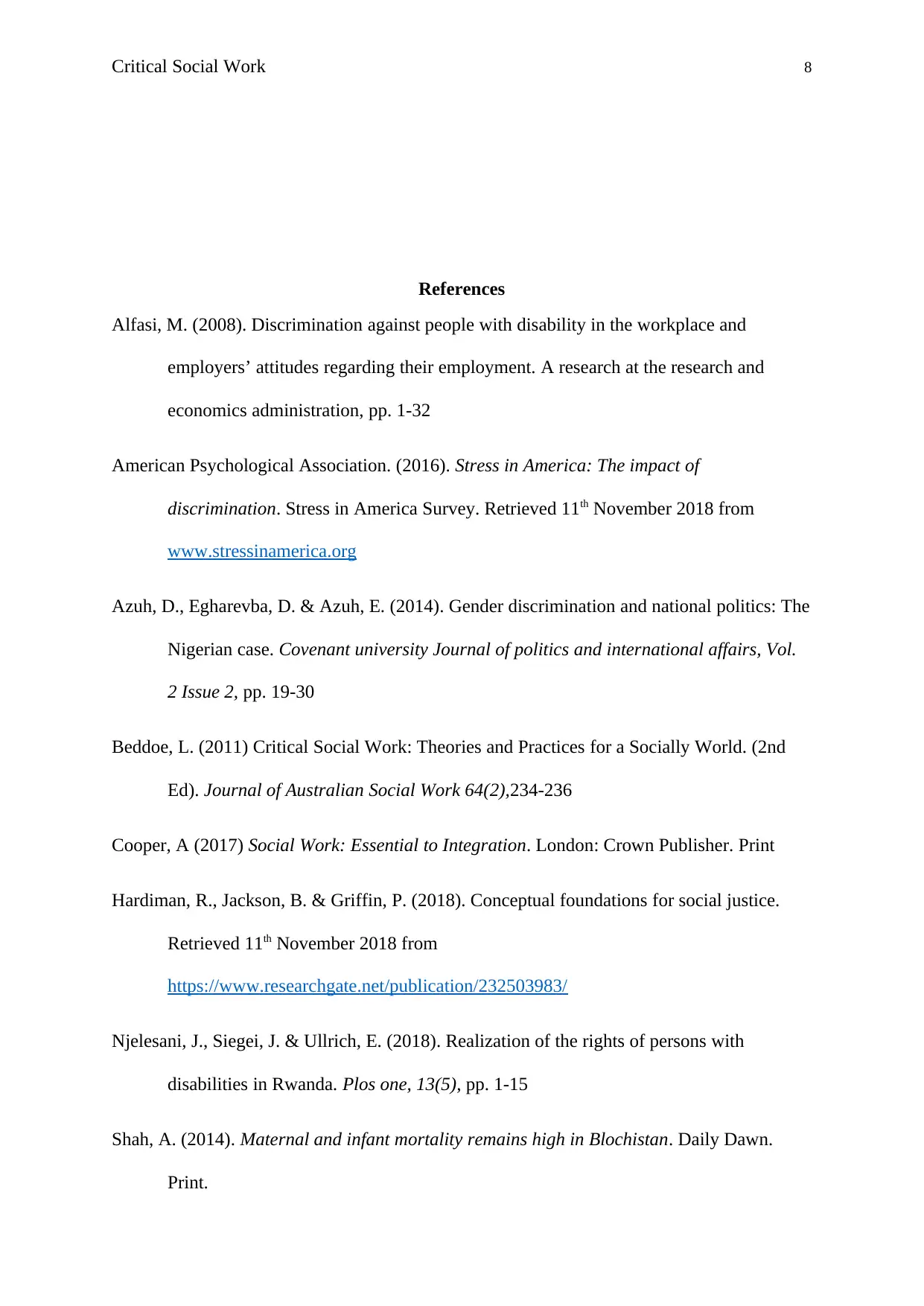
Critical Social Work 8
References
Alfasi, M. (2008). Discrimination against people with disability in the workplace and
employers’ attitudes regarding their employment. A research at the research and
economics administration, pp. 1-32
American Psychological Association. (2016). Stress in America: The impact of
discrimination. Stress in America Survey. Retrieved 11th November 2018 from
www.stressinamerica.org
Azuh, D., Egharevba, D. & Azuh, E. (2014). Gender discrimination and national politics: The
Nigerian case. Covenant university Journal of politics and international affairs, Vol.
2 Issue 2, pp. 19-30
Beddoe, L. (2011) Critical Social Work: Theories and Practices for a Socially World. (2nd
Ed). Journal of Australian Social Work 64(2),234-236
Cooper, A (2017) Social Work: Essential to Integration. London: Crown Publisher. Print
Hardiman, R., Jackson, B. & Griffin, P. (2018). Conceptual foundations for social justice.
Retrieved 11th November 2018 from
https://www.researchgate.net/publication/232503983/
Njelesani, J., Siegei, J. & Ullrich, E. (2018). Realization of the rights of persons with
disabilities in Rwanda. Plos one, 13(5), pp. 1-15
Shah, A. (2014). Maternal and infant mortality remains high in Blochistan. Daily Dawn.
Print.
References
Alfasi, M. (2008). Discrimination against people with disability in the workplace and
employers’ attitudes regarding their employment. A research at the research and
economics administration, pp. 1-32
American Psychological Association. (2016). Stress in America: The impact of
discrimination. Stress in America Survey. Retrieved 11th November 2018 from
www.stressinamerica.org
Azuh, D., Egharevba, D. & Azuh, E. (2014). Gender discrimination and national politics: The
Nigerian case. Covenant university Journal of politics and international affairs, Vol.
2 Issue 2, pp. 19-30
Beddoe, L. (2011) Critical Social Work: Theories and Practices for a Socially World. (2nd
Ed). Journal of Australian Social Work 64(2),234-236
Cooper, A (2017) Social Work: Essential to Integration. London: Crown Publisher. Print
Hardiman, R., Jackson, B. & Griffin, P. (2018). Conceptual foundations for social justice.
Retrieved 11th November 2018 from
https://www.researchgate.net/publication/232503983/
Njelesani, J., Siegei, J. & Ullrich, E. (2018). Realization of the rights of persons with
disabilities in Rwanda. Plos one, 13(5), pp. 1-15
Shah, A. (2014). Maternal and infant mortality remains high in Blochistan. Daily Dawn.
Print.
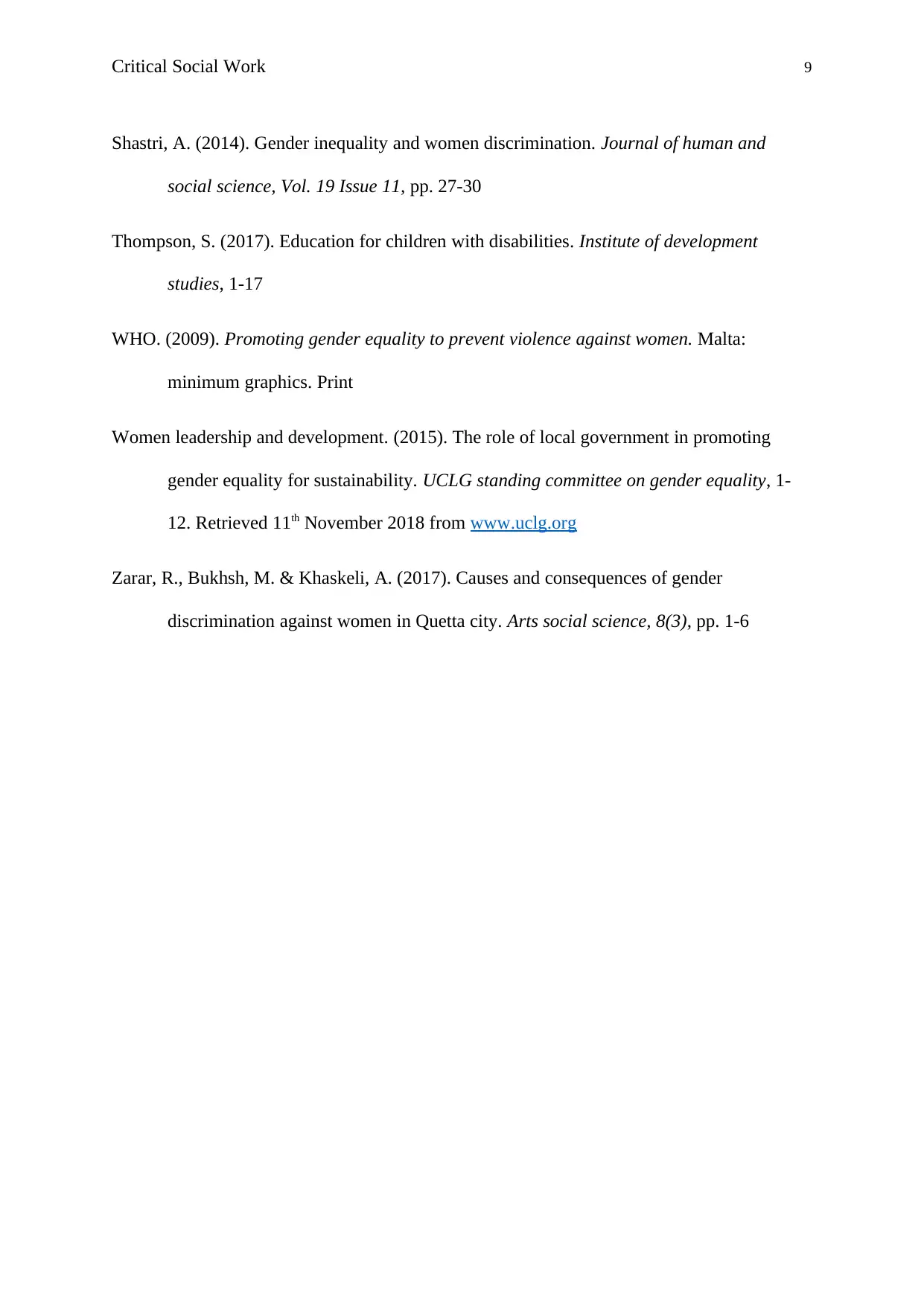
Critical Social Work 9
Shastri, A. (2014). Gender inequality and women discrimination. Journal of human and
social science, Vol. 19 Issue 11, pp. 27-30
Thompson, S. (2017). Education for children with disabilities. Institute of development
studies, 1-17
WHO. (2009). Promoting gender equality to prevent violence against women. Malta:
minimum graphics. Print
Women leadership and development. (2015). The role of local government in promoting
gender equality for sustainability. UCLG standing committee on gender equality, 1-
12. Retrieved 11th November 2018 from www.uclg.org
Zarar, R., Bukhsh, M. & Khaskeli, A. (2017). Causes and consequences of gender
discrimination against women in Quetta city. Arts social science, 8(3), pp. 1-6
Shastri, A. (2014). Gender inequality and women discrimination. Journal of human and
social science, Vol. 19 Issue 11, pp. 27-30
Thompson, S. (2017). Education for children with disabilities. Institute of development
studies, 1-17
WHO. (2009). Promoting gender equality to prevent violence against women. Malta:
minimum graphics. Print
Women leadership and development. (2015). The role of local government in promoting
gender equality for sustainability. UCLG standing committee on gender equality, 1-
12. Retrieved 11th November 2018 from www.uclg.org
Zarar, R., Bukhsh, M. & Khaskeli, A. (2017). Causes and consequences of gender
discrimination against women in Quetta city. Arts social science, 8(3), pp. 1-6
⊘ This is a preview!⊘
Do you want full access?
Subscribe today to unlock all pages.

Trusted by 1+ million students worldwide
1 out of 9
Related Documents
Your All-in-One AI-Powered Toolkit for Academic Success.
+13062052269
info@desklib.com
Available 24*7 on WhatsApp / Email
![[object Object]](/_next/static/media/star-bottom.7253800d.svg)
Unlock your academic potential
Copyright © 2020–2026 A2Z Services. All Rights Reserved. Developed and managed by ZUCOL.





